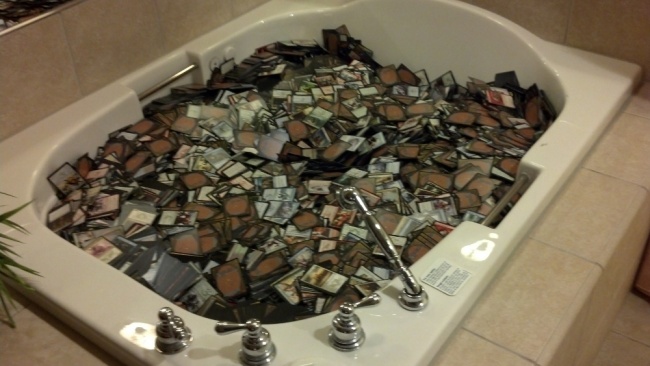Over the years I have on many occasions been called greedy, or told that my greed was a flaw. I would submit, ladies and gentlemen, that when one is a retailer, greed is indeed good. Perhaps necessary. One cannot have a good week and simply decide “good enough, let’s take a week off,” because the bills keep coming: rent, utilities, payroll. One must be looking for profit every week, every day, really.
I have been at my craft, this thing that is called “retailing,” for nearly 30 years. And, while I've spent many years paying myself less than minimum wage, I certainly do not work for that anymore. And I do it while trying to make sure both the customers who buy from me, and those who sell me their used collectibles, are happy with our transactions.
I do indeed try to profit on every transaction. When I sell a single D6, I want to make a profit. Host an RPG game, I want to earn a profit. Sell a single Magic card, a Booster Pack, a Fat Pack or a Booster Box, I make a profit. When I am feeling charitable, I give to the Humane Society. When I work, I get paid.
I imagine that other people get paid to work, too. I believe that is how they come by their money: They work, and earn, their spendable cash. And, whether they are working flipping burgers, taking X-rays as a technician, working as an ER Nurse, as a fireman, a garbage man or a veterinarian, I don't imagine people are always asking them to take less money for their work. Yet we retailers see this almost every day, people who want us to cut a deal, discount, and where do they think that discount comes from…? Well, whether they realize it or not, that discount comes right out of my pocket. And, when I don't give away some of my earnings, I am greedy?
I believe that my “greed” has led me well for some time now. I remember the day we had our best sales day ever. And, and at the end of the day, someone wanted to come in late to buy a special item. My then-wife wanted to call it a day, but I stayed late for them to shop, and they spent another $1500. When is it a bad time to make money? My contention is that there is never a bad time to make a good profit. Again, maybe I am mistaken. I've just never been presented with an opportunity to make a profit and I thought “Meh, too busy.”
It’s a delicate balance, of course. I try to pay fair prices for merchandise I get used, and I try to charge fair prices for that used merchandise. But, as with anything, the definition of “fair price” has some significant variance in what people believe it to be. Some folks think that if the going rate for a used video game on eBay is $40, I should give them $40. Others think I should then sell them that video game at 50% off the going rate. Few people who come into my store grasp supply and demand, and of those who don't, most can't grasp it if I explain it. I know. I've tried.
So, when someone comes in the best I can do is try to determine what they want for their goods, and then decide if what I am willing to pay meets their expectations. Literally, the easiest way for me to buy used goods is to get someone to tell me what they want for their items. Then I can just make a decision, not have to do the actual work. Because, though it may not seem like it, it is work to determine the value of a collection of cards, comics or even video games.
If I take the time to even look at your items, I already want to buy them. I also want to make money on them when I sell them, and I would like to make you happy with my price. That's complicated. It's really the most complicated thing I do. Because I want you to continue to come into my store, so I want to make you happy. I also want to keep HAVING a store, so I have to stay profitable.
My practices are to always tell someone what the value of their collection is, and then what I will pay for it. I also explain they can get more for it on eBay than what I am offering, because I consider eBay my method to dump the collection if I can't sell it in my store, and that I still plan to turn a profit when I do so. I consider this to be the ethical method of buying your stuff. You get told the value, you get told what I will pay, and you can make a decision whether you want to keep it, look for a better deal, or start your own eBay sales account.
Dealing in the used merchandise is tricky. As a retailer, we generally pay 50% of cost of new product, sometimes as much as 60%. But, I would almost never pay that for used merchandise. Does that seem unfair? Greedy? It isn't.
See, when I want to buy a new box of Magic cards, I call my distributor and order the box I want. They carry pretty much all new boosters from the past six sets or so. I can order the number of boxes I want, and the variety I want. I can even decide how fast I want to pay for it! I have distributors who give me 30 days, 14 days, or sell me only if I pay in advance. But: When someone walks in with their collection, I am expected to buy the items as presented, on the spot. For cash. I usually do that: Buy it all, the whole collection. But, it is not the cards I want, it is the cards THEY want to sell. I literally am not picking anything – except the price. So, in that respect, I am buying used items in exactly the opposite manner from the way I buy new stuff.
With New: I decide everything except price. This means the supplier decides price, which drives price up.
With Used: I decide nothing, except price, which drives price down, in most cases.
The other thing to consider when I am buying is turn rate. I can literally turn the entire NEW contents of my store every six weeks if I only buy quantities that will last me 30 days, because I can track previous sales and always keep a thin inventory on the store's shelves if I try. It is, after all, the job of distribution and publishers to keep the supply channel full. And, even though they fail, there is always good hot product available.
But with used items, if I buy the whole collection of anything, there will be HOT items (I hope), and plenty of “commons” (or chaff, drek, junk, whatever), which no matter what price I mark them at, they move too slowly and will not turn every six weeks. Again, I don't choose the merchandise, so I have to be careful choosing the price.
So, even though a box of Magic cards might have an MSRP of $143.64, and it might cost me $80, and I might sell them sealed at $125, even though I do not choose what I pay, and the market dictates (somewhat) what I charge, I can choose a quantity that will always allow me to sell out in six weeks, and it is a restock-able item.
And, of course, last, there are a limited number of sources for new sealed Magic product, while there is almost no limit to the number of collectors trying to sell me bulk.
Thus, supply and demand dictate that when buying used, I pay between 15-25% of resale value, unless the item is in high demand (like a set of Dual Lands, let’s say).
This got a little long winded. I hope that this illuminates the manner in which your local retail store may use in dealing in used product.
If you enjoyed this column, please visit my Facebook page and friend me. If you have suggestions for future columns, please send me a message through Facebook.
Thanks.
The opinions expressed in this column are solely those of the writer, and do not necessarily reflect the views of the editorial staff of ICv2.com.










